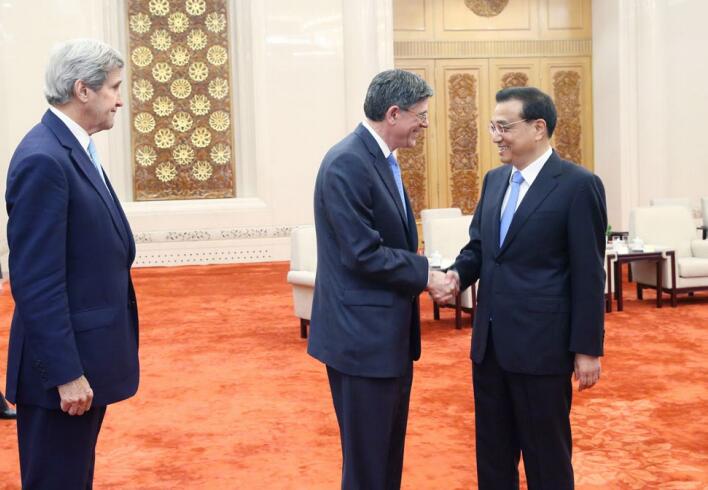China-US dialogue achieves significant outcome
 0 Comment(s)
0 Comment(s) Print
Print E-mail China.org.cn, June 29, 2016
E-mail China.org.cn, June 29, 2016
The eighth China-U.S. Strategic and Economic Dialogue (S&ED) was held in Beijing on June 6 and 7. More than 180 concrete achievements were achieved within the two tracks, including more than 60 outcomes in the economic track and 120 outcomes in the strategic track. The dialogue, held annually among high-level officials of the world's two largest economies, has made significant achievements despite a number of long-standing differences that remain to be resolved.
 |
|
Chinese Premier Li Keqiang (R) meets with U.S. Secretary of State John Kerry (L) and Treasury Secretary Jacob Lew, who are in Beijing to attend the eighth round of China-U.S. Strategic and Economic Dialogues and the seventh round of China-U.S. High-Level Consultation on People-to-People Exchange, June 7. |
Economic achievements
The economic dialogue was hosted by Chinese Vice Premier Wang Yang and U.S. Secretary of the Treasury Jacob Lew. The two sides exchanged views in key economic issues including strengthening economic policy cooperation, promoting open trade and investment, fostering financial stability and reform, and enhancing global cooperation and economic governance.
One of the issues is the ongoing Bilateral Investment Treaty (BIT) negotiations. The BIT has been under consultation since 2008 and has gone through more than 20 rounds of negotiations. During the dialogue, the two sides agreed to further promote the BIT, including exchange improved "negative lists" offers by mid-June.
China also pledged to continue market-oriented exchange rate reforms, allowing for two-way flexibility of the RMB. It reaffirmed its commitments to avoid competitive devaluation and not target the exchange rate for competitive purposes.
As the U.S. is concerned over China's steel overcapacity, China has restated its commitment to adopt measures to strictly contain steel capacity expansion, reduce net steel capacity, eliminate outdated steel capacity, and urge the exit of steel production capacity that falls short of environmental, energy, quality or safety standards.
Additionally, with the G20 Hangzhou Summit approaching, the two economies also expressed their commitment to working closely to promote strong, sustainable and balanced growth of the global economy.
Strategic achievements
Among the 120 strategic outcomes, China and the U.S. have emphasized their commitment to the following issues, the denuclearization of the Korean Peninsula, implementation of the global climate agreement, cooperation on strategic security issues, strengthening global health security, protecting the ocean, enhancing global nuclear security, address growing global humanitarian needs and enhancing disaster response capacity, deepening cooperation on food security and sustainable development, and combating international bribery and promoting responsible mineral supply chain practices.
The dialogue was held amidst the controversy over the South China Sea and other issues. Speaking at the opening ceremony of the dialogue, Chinese President Xi Jinping urged China and the United States to enhance mutual trust and make concerted efforts to manage differences and handle sensitive issues. He called for the two countries to intensify efforts to manage conflict and avoid strategic misjudgment.






Go to Forum >>0 Comment(s)